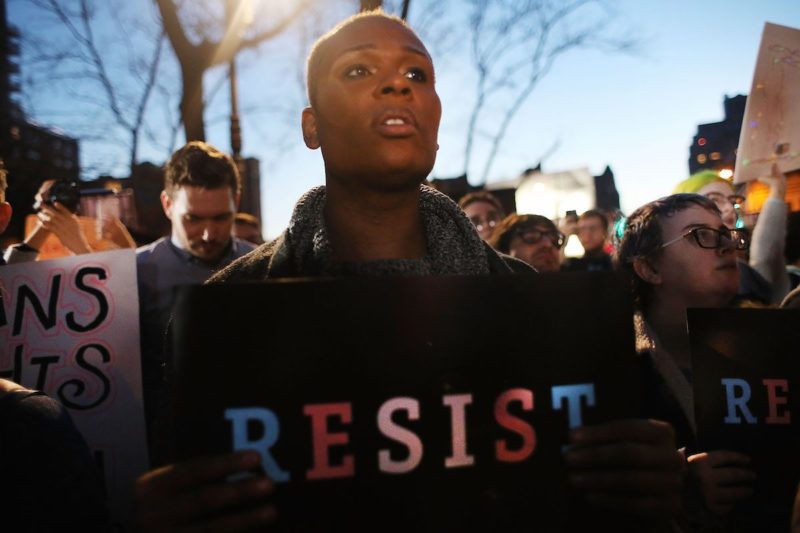Activists Rally to #ProtectTransWomen: If They Are Not Safe, ‘None of Us Are Safe’
"For transphobia to be abolished, every individual person has a role to play," said Wazi Maret, development director at the TGI Justice Project.

Keke Collier, Chyna Dupree, and Ciara McElveen were all murdered over the last week of February. They are among the seven transgender women of color killed in 2017 whose names are being chanted in rallies across the nation Wednesday.
This year is on track to be the most dangerous year yet for trans women of color, according to GetEQUAL, an LGBTQ equality organization that has called for a National Day of Action to #ProtectTransWomen, especially women of color.
A 2016 edition of the National Coalition of Anti-Violence Program’s annual report on hate violence found trans women of color account for 54 percent of all anti-LGBTQ homicides.
“Any resistance movement that is dynamic and powerful enough to overcome white supremacists and religious extremists who hold power in our government must also be bold enough to stand up and fight back against transphobic, racist, anti-woman, anti-femme forces in ourselves and in our neighborhoods,” said Angela Peoples, co-director of GetEQUAL, in an email to Rewire.
The idea is not just to rally, resist, and give visibility to issues affecting trans people, but to donate to organizations led by trans women and hire them as consultants in support.
Lourdes Ashley Hunter, executive director at the Trans Women of Color Collective, told Rewire Wednesday she intends to donate to several such organizations.
Arianna Lint, Executive Director, Arianna’s Center![]()
“I believe today is very important to raise awareness of the violence surrounding trans women, especially women of color and raise visibility of the issues they face daily,” she said. “For me, the actions are important but I need to go a little bit further to reach out and support the trans women working in the community.”
Trans women, particularly trans women of color, continue to face discrimination in their homes, schools, and workplaces, said Isa Noyola, director of programs at the Transgender Law Center, to Rewire. “They are pushed out of homes, not allowed to exist in society, and their gender and identity is questioned,” she said.
The National Center for Transgender Equality found in its most recent report that nearly one-third of the 27,715 transgender people responding to its 2015 survey have experienced homelessness at some point in their lifetime, with 12 percent having experienced homelessness in the year prior to their completion of the survey. Further, “while respondents in the [survey] overall were more than twice as likely as the U.S. population to be living in poverty, people of color, including Latino/a (43%), American Indian (41%), multiracial (40%), and Black (38%) respondents, were up to three times as likely as the U.S. population (14%) to be living in poverty.”
“We are fighting for our basic rights and our humanity in this world,” Noyola said. “We have always existed and we are a part of the fabric of every community.”
The nationwide actions of resistance planned Wednesday include an open mic and healing space in Minneapolis; a rally in Los Angeles; a vigil and celebration in Charlottesville, Virginia; and a speak out in Washington, D.C.
State-based violence is not new to LGBTQ communities, but President Donald Trump and his administration’s racist and xenophobic rhetoric have added to the escalating rates of hate and violence these groups are facing, GetEQUAL explained in an online statement.
“His administration’s latest attacks targeting transgender students and immigrants is an attempt to oppress our identities, control our lives, and intimidate us into compliance,” the statement reads.
“Eliminating anti-Black transphobia and creating conditions where every Black trans woman has what she needs to thrive, takes all of us,” said Shanelle Matthews from the Black Lives Matter Global Network. “We must start by examining how each of us, consciously and subconsciously, contributes to the conditions where people murder Black trans women violently and with impunity.”
That is exactly the intent behind the day of action, Angela Peoples told Rewire. “The day of action is intended to encourage cisgender (meaning people who are not transgender) and transgender people to work in collaboration to develop strategies to protect trans women in the face of escalated violence from the state, to uplift Black trans women’s leadership, and to address transphobia and transmisogyny within our communities. Moving forward, we must redefine the world we’re creating for ourselves and future generations to ensure that it can hold space for each and every brilliant, dynamic, complicated, and fantastic experience of trans women to flourish.”
